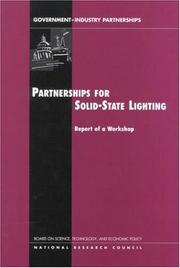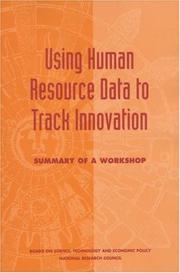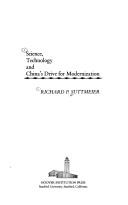Book
ISBN: 9780262330244 9780262029353 0262330245 0262029359 Year: 2015 Publisher: Cambridge, Massachusetts [Piscataqay, New Jersey] MIT Press IEEE Xplore
Abstract | Keywords | Export | Availability | Bookmark
 Loading...
Loading...Choose an application
- Reference Manager
- EndNote
- RefWorks (Direct export to RefWorks)
System Analysis --- Military research --- Military planning --- Technology and state --- Evaluation --- Methodology --- United States. --- Management --- United States --- Defenses --- Armed Forces --- Weapons systems --- Military research - United States - Evaluation --- Military planning - United States - Methodology --- Technology and state - United States --- United States - Defenses - Evaluation - Methodology --- United States - Armed Forces - Weapons systems - Evaluation
Book
ISBN: 2222041767 9782222041764 Year: 1988 Publisher: Paris : Editions du Centre National de la Recherche Scientifique,
Abstract | Keywords | Export | Availability | Bookmark
 Loading...
Loading...Choose an application
- Reference Manager
- EndNote
- RefWorks (Direct export to RefWorks)
Science policy --- Public administration --- Science and state --- Technology and state --- History --- Politique de la recherche --- Research policies --- Technologie --- technology --- sciences --- France --- USA --- etat --- politique scientifique --- technologie --- staat --- wetenschapsbeleid --- Wetenschapsbeleid --- Openbaar bestuur --- Science --- State and science --- State, The --- State and technology --- Technology --- Endowment of research --- Government policy --- Science and state - United States - History --- Technology and state - France - History --- Technology and state - United States - History --- Science and state - France - History --- Secteur publique
Book
ISBN: 1441966846 9786612982460 1441966854 128298246X Year: 2010 Publisher: New York : Springer,
Abstract | Keywords | Export | Availability | Bookmark
 Loading...
Loading...Choose an application
- Reference Manager
- EndNote
- RefWorks (Direct export to RefWorks)
From the race-to-space in the 1950s to the current furor over global warming, James Bennett traces the subtle and not-so-subtle ways in which government has co-opted scientific research and reinforced a culture in which challengers to proscribed wisdom are frozen out. Ripped from the headlines, Bennett offers a compelling, entertaining, and thought-provoking perspective on political influence in scientific research and its implications for a democratic society. Praise for The Doomsday Lobby "During the Nineteenth Century, almost entirely on private funding, American science grew from practically nothing to world class. Now, however, over fifty percent of American science is funded by the federal government. Dr. Bennett traces the path, "crisis" after "crisis," by which American science became practically an arm of the federal government. His tale is a cautionary one, warning against future "crisis mongers" who would extend the government's already majority control of American science even further. His warning is a timely one, and it should be heeded." Joseph P. Martino, author of Science Funding: Politics and Porkbarrel "Bennett's latest book offers a challenging interpretation of the rise of the American federal science establishment since World War II. Focusing primarily on the growth of the space program, Bennett argues that crisis, real or imagined, is the source of state power and state funding for science. The Doomsday Lobby offers what no doubt will be viewed as a controversial contribution to the history of American science policy, and more broadly to an understanding of the role of the state in society." James D. Savage, Professor of Politics, University of Virginia, and author of Funding Science in America James T. Bennett is Eminent Scholar and William P. Snavely Professor of Political Economy and Public Policy at George Mason University, and Director of The John M. Olin Institute for Employment Practice and Policy. He is the author or editor of over a dozen books, including Unhealthy Charities, The Politics of American Feminism, Stifling Political Competition, and Not Invited to the Party.
Environmentalism -- United States. --- Federal aid to research -- United States. --- Research -- Economic aspects -- United States. --- Science and state -- United States. --- Technology -- Economic aspects -- United States. --- Technology and state -- United States. --- Science and state --- Science --- Technology and state --- Physical Sciences & Mathematics --- Sciences - General --- Social aspects --- Popular works. --- Political science. --- Astronomy. --- Popular Science. --- Popular Science in Astronomy. --- Popular Science, general. --- Political Science. --- Science (General). --- Administration --- Civil government --- Commonwealth, The --- Government --- Political theory --- Political thought --- Politics --- Science, Political --- Social sciences --- State, The

ISBN: 0309083192 9786610184583 1280184582 0309506646 9780309506649 9780309083195 0305083192 0309169216 9780309169219 9781280184581 6610184585 Year: 2002 Publisher: Washington, D.C. National Academy Press
Abstract | Keywords | Export | Availability | Bookmark
 Loading...
Loading...Choose an application
- Reference Manager
- EndNote
- RefWorks (Direct export to RefWorks)
Cooperative industrial research -- United States. --- Electronic books. -- local. --- Light emitting diodes. --- Lighting. --- Technological innovations -- Government policy -- United States. --- Technology and state -- United States. --- Light emitting diodes --- Lighting --- Cooperative industrial research --- Technology and state --- Technological innovations --- Electrical Engineering --- Electrical & Computer Engineering --- Engineering & Applied Sciences --- Government policy --- Illumination --- LEDs (Light emitting diodes) --- Research, Industrial --- Buildings --- Light sources --- Diodes, Semiconductor --- Electroluminescent devices --- LED lamps --- Light-emitting electrochemical cells --- Environmental engineering
Book
ISBN: 0309266432 0309266440 0309266467 Year: 2012 Publisher: Washington, District of Columbia : National Academies Press,
Abstract | Keywords | Export | Availability | Bookmark
 Loading...
Loading...Choose an application
- Reference Manager
- EndNote
- RefWorks (Direct export to RefWorks)
"A committee under the auspices of the Board on Science, Technology, and Economic Policy (STEP), is conducting a study of selected state and regional programs in order to identify best practices with regard to their goals, structures, instruments, modes of operation, synergies across private and public programs, funding mechanisms and levels, and evaluation efforts. The committee is reviewing selected state and regional efforts to capitalize on federal and state investments in areas of critical national needs. Building the Arkansas Innovation Economy: Summary of a Symposium includes both efforts to strengthen existing industries as well as specific new technology focus areas such as nanotechnology, stem cells, and energy in order to better understand program goals, challenges, and accomplishments. As a part of this review, the committee is convening a series of public workshops and symposia involving responsible local, state, and federal officials and other stakeholders. These meetings and symposia will enable an exchange of views, information, experience, and analysis to identify best practice in the range of programs and incentives adopted. Drawing from discussions at these symposia, fact-finding meetings, and commissioned analyses of existing state and regional programs and technology focus areas, the committee will subsequently produce a final report with findings and recommendations focused on lessons, issues, and opportunities for complementary U.S. policies created by these state and regional initiatives. Since 1991, the National Research Council, under the auspices of the Board on Science, Technology, and Economic Policy, has undertaken a program of activities to improve policymakers' understandings of the interconnections of science, technology, and economic policy and their importance for the American economy and its international competitive position. The Board's activities have corresponded with increased policy recognition of the importance of knowledge and technology to economic growth. One important element of STEP's analysis concerns the growth and impact of foreign technology programs.1 U.S. competitors have launched substantial programs to support new technologies, small firm development, and consortia among large and small firms to strengthen national and regional positions in strategic sectors. Some governments overseas have chosen to provide public support to innovation to overcome the market imperfections apparent in their national innovation systems. They believe that the rising costs and risks associated with new potentially high-payoff technologies, and the growing global dispersal of technical expertise, underscore the need for national R&D programs to support new and existing high-technology firms within their borders."--Publisher's description.
Competition -- United States -- Congresses. --- Information society -- United States -- Management -- Congresses. --- Information technology -- Economic aspects -- United States -- Congresses. --- Knowledge management -- United States -- Congresses. --- Technological innovations -- Economic aspects -- United States -- Congresses. --- Technology and state -- United States -- Congresses. --- Information technology --- Technological innovations --- Technology and state --- Knowledge management --- Information society --- Competition --- Economics --- Health Care Economics and Organizations --- Social Sciences --- Health Care --- Anthropology, Education, Sociology and Social Phenomena --- Economic Development --- Engineering & Applied Sciences --- Technology - General --- Economic aspects --- Management

ISBN: 0844734942 9780844734941 Year: 1982 Volume: 375 Publisher: Washington AEI
Abstract | Keywords | Export | Availability | Bookmark
 Loading...
Loading...Choose an application
- Reference Manager
- EndNote
- RefWorks (Direct export to RefWorks)
Sociology of policy --- United States --- Science and state --- Technology and state --- Federal aid to research --- 37 --- -Science and state --- -Technology and state --- -State and technology --- Technology --- Endowment of research --- Science --- Science policy --- State and science --- State, The --- Research --- Research grants --- Opvoeding en onderwijs --(algemeen) --- Government policy --- Law and legislation --- Federal aid --- Finance --- -Opvoeding en onderwijs --(algemeen) --- 37 Opvoeding en onderwijs --(algemeen) --- 37 Education --- Education --- Science and state - United States --- Technology and state - United States --- Federal aid to research - United States --- United States of America
Book
ISBN: 2707116742 9782707116741 Year: 1987 Publisher: Paris La Découverte
Abstract | Keywords | Export | Availability | Bookmark
 Loading...
Loading...Choose an application
- Reference Manager
- EndNote
- RefWorks (Direct export to RefWorks)
Sociology of organization --- Sociology of work --- Industrial policy --- Technology and state --- Technological innovations --- Economic aspects --- Industry and state --- -Industry and state --- -Technology and state --- -Technological innovations --- -Industrial policy --- -331.103 --- 658.51 --- Industrie 338.45 --- Business --- Industries --- Economic policy --- Breakthroughs, Technological --- Innovations, Industrial --- Innovations, Technological --- Technical innovations --- Technological breakthroughs --- Technological change --- Creative ability in technology --- Inventions --- Domestication of technology --- Innovation relay centers --- Research, Industrial --- Technology transfer --- State and technology --- Technology --- Endowment of research --- Science and state --- -Economic aspects --- -Government policy --- Government policy --- 331.103 --- Industrial policy - United States --- Industrial policy - France --- Technology and state - United States --- Technology and state - France --- Technological innovations - Economic aspects - United States --- Technological innovations - Economic aspects - France

ISBN: 0309084245 9786610209507 128020950X 0309501946 9780309501941 6610209502 9780309084246 0305084245 0309182921 Year: 2002 Publisher: Washington, D.C. National Academy Press
Abstract | Keywords | Export | Availability | Bookmark
 Loading...
Loading...Choose an application
- Reference Manager
- EndNote
- RefWorks (Direct export to RefWorks)
"This volume is the summary of a second STEP workshop, chaired by board memder Mark Myers, formerly chief technical officer of Xerox Corporation. The workshop explored how data on scientists, engineers, and other professionals-data on their training and skills, mobility and career paths, use of time, relationships across institutions and sectors, and productivity-can be used to illuminate aspects of innovation that current R&D, patent and other data, by themselves, do not fully capture." -- p. viii, Preface.
Electronic books. -- local. --- Industrial policy -- United States -- Congresses. --- Research, Industrial -- United States -- Congresses. --- Science and state -- United States -- Congresses. --- Technological innovations -- United States -- Congresses. --- Technology and state -- United States -- Congresses. --- Technological innovations --- Industrial policy --- Research, Industrial --- Technology and state --- Science and state --- Creativeness --- United States --- Employee Performance Appraisal --- Technology --- Thinking --- Personnel Management --- Technology, Industry, and Agriculture --- North America --- Personality --- Mental Processes --- Organization and Administration --- Behavior and Behavior Mechanisms --- Technology, Industry, Agriculture --- Americas --- Psychological Phenomena and Processes --- Geographic Locations --- Health Services Administration --- Psychiatry and Psychology --- Health Care --- Geographicals --- Technology - General --- Engineering & Applied Sciences --- Contract research --- Industrial research --- Research --- Engineering experiment stations --- Inventions

ISBN: 0817972323 9780817972325 Year: 1980 Volume: 223 Publisher: Stanford (Calif.): Hoover institution press
Abstract | Keywords | Export | Availability | Bookmark
 Loading...
Loading...Choose an application
- Reference Manager
- EndNote
- RefWorks (Direct export to RefWorks)
Science and state --- Science --- Technology and state --- Technology --- Politique scientifique et technique --- Sciences --- Technologie --- International cooperation --- Coopération internationale --- S19/0130 --- S09/0250 --- S10/0760 --- 316.4 <51> --- -Science and state --- -Technology --- -Technology and state --- -State and technology --- Endowment of research --- Applied science --- Arts, Useful --- Science, Applied --- Useful arts --- Industrial arts --- Material culture --- Science policy --- State and science --- State, The --- Natural science --- Science of science --- China: Natural sciences--General works --- China: Foreign relations and world politics--General works: after 1840 --- China: Economics, industry and commerce--Transfer of technology --- Sociale processen--China --- Government policy --- International cooperation. --- -China: Natural sciences--General works --- 316.4 <51> Sociale processen--China --- Coopération internationale --- Technology and international relations --- Technology transfer --- International cooperation in science --- Science and state - China --- Science and state - United States --- Science - International cooperation --- Technology and state - China --- Technology and state - United States --- Technology - International cooperation
Book
ISBN: 0309266769 0309266777 9780309266765 9780309266772 0309266793 Year: 2013 Publisher: Washington, D.C.
Abstract | Keywords | Export | Availability | Bookmark
 Loading...
Loading...Choose an application
- Reference Manager
- EndNote
- RefWorks (Direct export to RefWorks)
"Since 1991, the National Research Council, under the auspices of the Board on Science, Technology, and Economic Policy, has undertaken a program of activities to improve policymakers' understandings of the interconnections of science, technology, and economic policy and their importance for the American economy and its international competitive position. The Board's activities have corresponded with increased policy recognition of the importance of knowledge and technology to economic growth. One important element of STEP's analysis concerns the growth and impact of foreign technology programs. U.S. competitors have launched substantial programs to support new technologies, small firm development, and consortia among large and small firms to strengthen national and regional positions in strategic sectors. Some governments overseas have chosen to provide public support to innovation to overcome the market imperfections apparent in their national innovation systems. They believe that the rising costs and risks associated with new potentially high-payoff technologies, and the growing global dispersal of technical expertise, underscore the need for national R&D programs to support new and existing high-technology firms within their borders. Similarly, many state and local governments and regional entities in the United States are undertaking a variety of initiatives to enhance local economic development and employment through investment programs designed to attract knowledge-based industries and grow innovation clusters. These state and regional programs and associated policy measures are of great interest for their potential contributions to growth and U.S. competitiveness and for the "best practice" lessons that they offer for other state and regional programs. STEP's project on State and Regional Innovation Initiatives is intended to generate a better understanding of the challenges associated with the transition of research into products, the practices associated with successful state and regional programs, and their interaction with federal programs and private initiatives. The study seeks to achieve this goal through a series of complementary assessments of state, regional, and federal initiatives; analyses of specific industries and technologies from the perspective of crafting supportive public policy at all three levels; and outreach to multiple stakeholders. Building the Ohio Innovation Economy: Summary of a Symposium explains the of the study, which is to improve the operation of state and regional programs and, collectively, enhance their impact."-- Publisher's description.
Energy conservation -- Technological innovations -- Ohio -- Congresses. --- Energy conservation -- Technological innovations -- United States -- Congresses. --- Manufacturing industries -- Ohio -- Congresses. --- Manufacturing industries -- United States -- Congresses. --- Technological innovations -- Economic aspects -- Ohio -- Congresses. --- Technological innovations -- Economic aspects -- United States -- Congresses. --- Technology and state -- United States -- Congresses. --- Manufacturing industries --- Energy conservation --- Technological innovations --- Technology and state --- Organization and Administration --- Research --- Models, Theoretical --- Economics --- Investigative Techniques --- Health Services Administration --- Social Sciences --- Health Care Economics and Organizations --- Science --- Analytical, Diagnostic and Therapeutic Techniques and Equipment --- Anthropology, Education, Sociology and Social Phenomena --- Health Care --- Natural Science Disciplines --- Disciplines and Occupations --- Biomedical Research --- Models, Organizational --- Economic Development --- Organizational Innovation --- Business & Economics --- Industries --- Economic aspects --- Conservation of energy resources --- Conservation of power resources --- Rational use of energy --- RUE (Rational use of energy) --- Breakthroughs, Technological --- Innovations, Industrial --- Innovations, Technological --- Technical innovations --- Technological breakthroughs --- Technological change --- Conservation of natural resources --- Power resources --- Energy consumption --- Energy policy --- Recycling (Waste, etc.) --- Manufactures --- Creative ability in technology --- Inventions --- Domestication of technology --- Innovation relay centers --- Research, Industrial --- Technology transfer --- economics --- Ohio. --- E-books --- Organizational Models --- Model, Organizational --- Organizational Model --- Change, Organizational --- Innovation, Organizational --- Organizational Change --- Changes, Organizational --- Innovations, Organizational --- Organizational Changes --- Organizational Innovations --- Development, Economic --- Economic Growth --- Growth, Economic

 Search
Search Feedback
Feedback About UniCat
About UniCat  Help
Help News
News